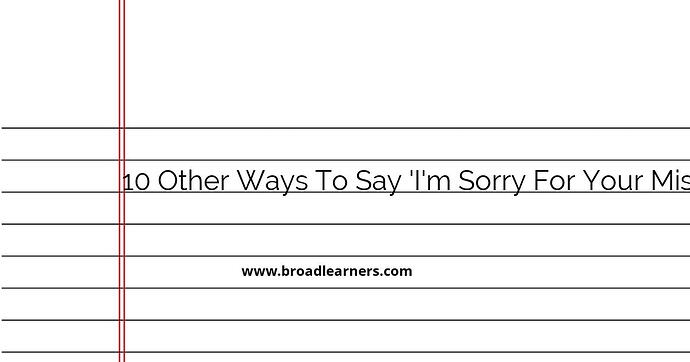When you make a mistake, it's important to take responsibility and apologize. Saying 'I'm sorry for your mistake' is a common way to express remorse, but there are other alternatives you can use to convey the same sentiment. Here are 10 other ways to say 'I'm sorry for your mistake':
- I apologize for the error
- I take full responsibility for the mistake
- I am deeply sorry for my error
- Please accept my sincere apologies
- I regret the mistake I made
- I'm truly sorry for the error
- I want to apologize for my mistake
- I am sorry for my oversight
- I humbly apologize for the mistake
- Please forgive me for the error
Now let's explore each alternative in more detail:
1. I apologize for the error
This phrase is a formal and professional way to express regret for your mistake. It acknowledges your responsibility and shows that you understand the impact of your error.
Example: 'I apologize for the error in the report. It was my oversight, and I take full responsibility for the mistake.'
2. I take full responsibility for the mistake
This statement demonstrates accountability and ownership of your mistake. It shows that you are willing to accept the consequences and make amends.
Example: 'I take full responsibility for the mistake in the project. I understand the impact it has caused, and I am committed to rectifying the situation.'
3. I am deeply sorry for my error
This phrase expresses a sincere and heartfelt apology for your mistake. It conveys genuine remorse and the desire to make things right.
Example: 'I am deeply sorry for my error in the email. I understand the confusion it may have caused, and I will ensure it doesn't happen again.'
4. Please accept my sincere apologies
This sentence is a polite and formal way to ask for forgiveness for your mistake. It shows humility and genuine remorse.
Example: 'Please accept my sincere apologies for the mistake in the presentation. I assure you that I will take the necessary steps to prevent such errors in the future.'
5. I regret the mistake I made
This phrase expresses remorse and acknowledges the impact of your mistake. It shows that you genuinely feel sorry for your actions.
Example: 'I regret the mistake I made in the meeting. I understand the frustration it may have caused, and I will work to ensure it doesn't happen again.'
6. I'm truly sorry for the error
This statement emphasizes the sincerity of your apology. It conveys that you genuinely regret your mistake and are committed to making amends.
Example: 'I'm truly sorry for the error in the calculations. I understand the inconvenience it may have caused, and I will take immediate steps to rectify the situation.'
7. I want to apologize for my mistake
This sentence expresses your desire to make amends and shows that you recognize your mistake. It conveys a genuine apology.
Example: 'I want to apologize for my mistake in the report. I understand the importance of accuracy, and I will ensure it doesn't happen again.'
8. I am sorry for my oversight
This phrase acknowledges that your mistake was due to an oversight on your part. It demonstrates accountability and a willingness to learn from your error.
Example: 'I am sorry for my oversight in the project timeline. I should have double-checked the dates, and I take full responsibility for the mistake.'
9. I humbly apologize for the mistake
This statement shows humility and acknowledges that you made a mistake. It conveys a sincere and genuine apology.
Example: 'I humbly apologize for the mistake in the customer order. I understand the inconvenience it may have caused, and I will do everything in my power to rectify the situation.'
10. Please forgive me for the error
This sentence is a humble and sincere request for forgiveness. It shows that you genuinely regret your mistake and are seeking reconciliation.
Example: 'Please forgive me for the error in the financial report. I understand the importance of accuracy, and I will take immediate steps to rectify the mistake.'
These alternatives can be used in various professional and personal contexts to convey your apology for a mistake. Choose the phrase that best fits the situation and your relationship with the person you are apologizing to. Remember, sincerity and genuine remorse are key when apologizing for a mistake.
Did I miss anything? Respond below
